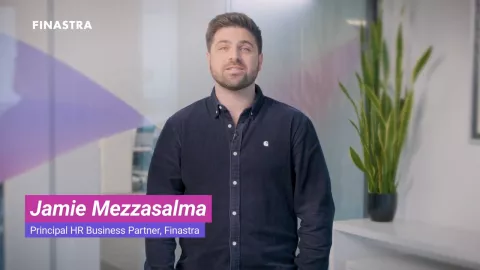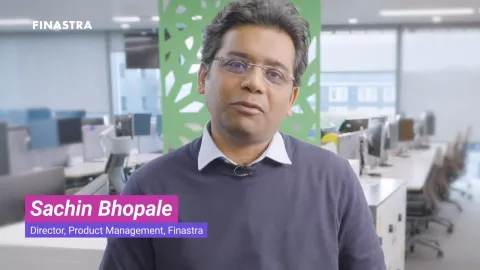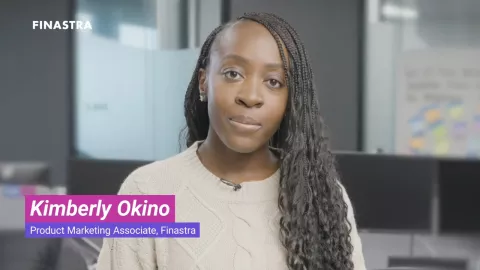Philip Crisp, Senior Software Engineer, talks about his career development, and how Finastra continues to break down barriers to create a space where people can openly discuss their mental health.

I’m Philip and I’m a Senior Software engineer at Finastra, which is an incredibly rewarding role. First you have the challenge: a client has a need, perhaps one they don’t even know about yet, and it’s your role to investigate the business domain and requirement and come up with a solution. You’re essentially a professional problem solver! Once you’ve identified that need, and you understand the domain, you go away and create something to address it. Getting to see people using your software is incredibly rewarding. It can be daunting at times, as some of the clients we deal with are massive institutions, but they trust the Finastra brand and our people.
I think the biggest misconception about working for a tech giant like Finastra is the dreaded “crunch” where a deadline is looming and work-life balance goes out the window. Now I’ve been here for 3 years and I’ve worked with people from across the business and I can say with confidence that we don’t have a crunch culture here. At Finastra you’re given the time, resources and support you need to get the job done without losing sight of the fact you’re a person with a life to go to at the end of the day. Even though we’re a huge company with a global footprint, everyone has time for everyone else, regardless of their role, responsibility or geographic location. You can reach out directly to members of the ELT with an idea and they’ll listen, provide feedback and potentially even action your idea.
Despite this I would still have to say that my biggest challenge is switching off! I can get so enveloped in a problem that even after I finish work my mind is still ticking over - You know it’s been a busy day when you’re seeing code in your sleep! Working from home has made this easier though as I can disconnect from work rather than commuting for a couple of hours. But if an idea pops into my head, I’ve got everything I need to quickly go off and investigate it to see if it’s worth carrying on that train of thought in the morning. As I’m not commuting now as much as I was so that means I’ve got more time for my family, making the work-life balance easier to maintain.
It is so nice to be at a company that understands the needs of its people: the moment that solidified for me that this was the right place to be was after my mum had a near-fatal car accident of which I was a witness and also the first on scene. That was a very difficult time for me and my family as she was in a coma in intensive care. During this time I kept my manager updated and spent a lot of time travelling to and from the hospital. My manager went above and beyond to make sure that I was able to spend time with my family whilst she recovered. The accommodations he made went far beyond what I expected from an employer and meant that I could be there for my family and could also keep on top of my work.
We’re really fortunate that we’ve been leveraging technologies for a long time that allow us to work remotely, so when we shifted in response to the pandemic, it was a manageable change. I’d say that was the biggest shock to my system from the transition: I would normally get to work for 7am and spend 2 hours a day on innovation before my colleagues got in, now with other commitments at home that I have to deal with that time has been cut to about 30 minutes a day. My tip for working from home over a long period is to set up a permanent workspace, somewhere away from where you would go to relax at the end of the day if possible. That way you can work in comfort and you have everything you need at your fingertips when you need it. But when it comes time to switch off and spend time with your loved ones you can do so and maintain a healthy work-life separation. Finastra take the work-life balance of its employees seriously. There’s a lot of measures in place to ensure that colleagues are able to work from home, come into the office (if appropriate) and make sure that when you’re home and not working that you can make the most from your time off / with your loved ones.
I don’t find it so challenging to work from home as there is a lot of variety in my role, because of the scope of our clients and people: The solution I work on in my BAU is an electronic invoicing system for a global company with a footprint in over 200 countries. The activities we do for them range from new features / upgrades, investigations and support all the way through to new product launches. The number of items we can be dealing with at any one time is huge and is a credit to our management that they balance them all. When I’m not working on my BAU, I’m working on innovation projects with teams around the globe. I’m currently involved in 2 innovation projects with teams from the Philippines, Switzerland as well as Wales and England. I’m also working on a hackathon project with colleagues from the US, Canada and Wales for our global Hackathon.
Working from a small office in Bangor it was easy to miss how big Finastra is and how much of an impact we make on the Financial industry. When I was invited down to London for FusionOne in 2019 I got to really see the true scope of Finastra and our impact. I also had the pleasure of representing Finastra at Sibos 2020 and bringing home a win in the Fostering Financial Inclusion category. Finastra is built for the future because we’re always looking for ways that we can leverage our position to do some good in the world. Be that with one of our many CSR activities, by launching products that are intended to help the end consumer with a difficult task or even by enhancing our policies to be more environmentally conscious.



